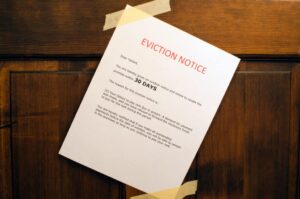An Update on Eviction Moratoria
At the beginning of the pandemic in Spring of 2020, a federal moratorium on housing evictions was passed. The policy’s intent was to ensure renters weren’t forced out of their homes during a time when many Americans were under quarantine and out of work. Eviction moratoriums in most cities were only intended to last 60 days after the public health emergency was declared, with many, including the moratorium in the District of Columbia, set to phase out at the end of July.
However, the Biden administration recently authorized the CDC to issue an extension of the moratorium on evictions through October 3rd in light of the rapidly spreading COVID-19 Delta variant that accounts for more than 80% of new coronavirus cases. This new moratorium only applies to counties where the CDC has deemed the level of community transmission to be “substantial” to “high”, though most U.S. counties meet this standard.
The moratorium has received pushback from apartment owners, as the National Apartment Association argues that “[the moratorium] jeopardizes the long-term viability of housing infrastructure and sets a dangerous precedent for future disaster-response measures.” The organization recently filed a lawsuit in the U.S. Court of Federal Claims on behalf of apartment owners seeking payback from non-rent payments due to the moratorium. In DC, a full hearing before the Court of Appeals in September is expected to decide whether the moratorium unconstitutionally “limits property owners rights to go to court to regain their property” as was ruled in DC Superior Court, or if the moratorium does not restrict landlords’ access to courts, only limiting their ability to pursue imminent eviction.
In the District of Columbia, new legislation was introduced to replace the original moratorium set to phase out at the end of July, while it would not offer the same blanket protection on evictions. it was still intended to offer tenant protections in light of eviction notices that were set to fully resume in November. Under the new legislation, landlords may begin sending notices of non-payment to tenants once the bill has been signed and may begin to file for evictions on October 12th, provided the tenant owes at least $600 in rent and has applied for DC’s rent relief program.
Other stipulations to the resumption of eviction filings include the conditions that rental assistance should be planned, legal defense must be offered (if the tenant applies for rental assistance within 60 days of receiving a past due notice), and thresholds of non-rent/non-utility payment must be met before eviction is warranted. Although rental assistance is an option available to tenants, the District’s rental assistance program has struggled. According to the Washington Post, less than 20% of the $200 million fund has been distributed since being allocated to the city by Congress in December.
The effect that the continuation of the moratorium has on the rental market is uncertain, though it coincides with vacancy that had been returning to pre pandemic levels as of summer 2021. As of June, Class B apartment vacancy was recorded at 2.3%, down 130 basis points from that time last year. It had also decreased from the winter, as Class B vacancy was recorded at 3.9% at the end of the first quarter in March and at 3.7% in December 2020. Vacancy in the Class B market might continue to decrease in the coming months, though this trend will likely reflect renter preferences to relocate to markets based on affordability, transit access, and work-from-home lifestyle.
Sources:
https://www.cnn.com/2021/08/03/politics/eviction-moratorium-high-covid-spread/index.html
https://www.npr.org/2021/08/03/1024345276/the-biden-administration-plans-a-new-eviction-moratorium-after-a-federal-ban-lap
https://covid.cdc.gov/covid-data-tracker/#county-view
https://www.jdsupra.com/legalnews/washington-dc-s-covid-19-eviction-7272192/
https://www.foxbusiness.com/real-estate/another-eviction-moratorium-puts-backbone-of-rental-housing-at-risk-industry-leader-says
https://apartment.school/what-can-i-get-evicted-for-complete-guide/
